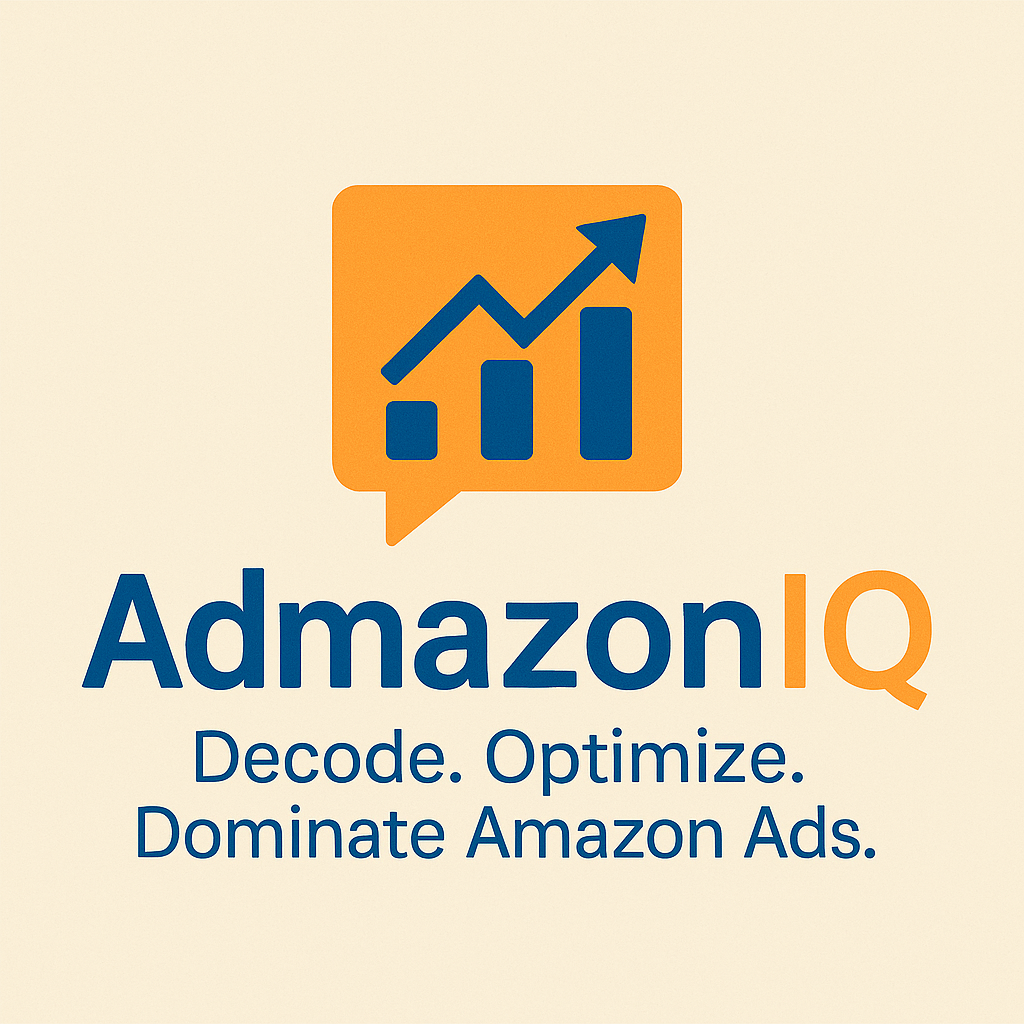📘 Amazon Ad Glossary (A–Z)
Decode every Amazon Advertising term with clarity. Whether you’re a beginner or scaling brand, this glossary helps you understand the language of Amazon Ads and optimize confidently.
🔤 A
ACOS (Advertising Cost of Sales) – The ratio of ad spend to attributed sales. Formula: (Ad Spend ÷ Ad Sales) × 100. A lower ACOS typically indicates greater ad efficiency.
Ad Console – Amazon’s UI platform where advertisers create and manage Sponsored Ads (SP, SB, SD).
Ad Group – A container within a campaign holding ads and shared targeting settings (keywords or ASINs).
Ad Placement – The location where your ad appears — e.g., Top of Search, Product Detail Page, Rest of Search.
Ad Rank – Determines whether and where your ad appears, influenced by bid, relevancy, and performance.
AMC (Amazon Marketing Cloud) – A privacy-safe, SQL-based analytics tool for analyzing cross-channel performance and building audiences.
ASIN (Amazon Standard Identification Number) – Unique identifier for a product on Amazon. Common in product targeting.
Audience Targeting – Allows ads (especially in DSP and Sponsored Display) to reach shoppers based on interests, behaviors, or purchase history.
Auto Campaign – A campaign using automatic targeting where Amazon decides which search terms or products to match.
🔤 B
Bid – The max amount you’re willing to pay for a click or 1,000 impressions (CPM). Can be adjusted dynamically or manually.
Bid Adjustment – Modifiers applied to placements (Top of Search, Product Page) to control bid multipliers.
Brand Analytics – A tool in Seller/Vendor Central offering shopper behavior insights like top keywords and repeat purchase rates.
Brand Registry – Amazon program that gives brands enhanced tools like Sponsored Brands, A+ Content, and more.
Brand Store – Your custom Amazon storefront, often linked to Sponsored Brands ads.
Broad Match – A keyword match type that allows ads to show for loosely related search terms, including synonyms and misspellings.
Budget Cap – Maximum spend limit set at the campaign or portfolio level.
🔤 C
Campaign – The highest level in your Amazon Ads structure containing ad groups, budget, and targeting settings.
Campaign Budget – The total amount allocated to spend per day or for the entire campaign lifecycle.
Category Targeting – Product targeting type that lets you advertise against entire product categories.
Click – An action taken by a shopper to engage with your ad. Used to measure CTR and CPC.
Click-Through Rate (CTR) – (Clicks ÷ Impressions) × 100. A higher CTR indicates better relevance and ad quality.
Conversion Rate (CVR) – (Orders ÷ Clicks) × 100. Indicates how many clicks turned into purchases.
Cost Per Click (CPC) – What you actually pay per click on your ad. Influenced by bidding and competition.
Coupon – A discount or promotion displayed alongside ads to boost conversion.
🔤 D
Defensive Targeting – Targeting your own brand/ASINs to block competitors from hijacking your traffic.
Detail Page View Rate (DPVR) – Used in DSP — how often impressions led to a product detail page view.
Display Ads (Sponsored Display / DSP) – Visual ads targeting audiences or product pages, used for awareness or retargeting.
Dynamic Bidding – A bidding strategy that adjusts your bid up or down in real time based on likelihood of conversion.
🔤 E
Exact Match – A keyword match type requiring a very close match between the keyword and the shopper’s search term.
Engaged View – In video and DSP reporting, it measures non-click interactions (e.g., views ≥ 10 seconds).
Eligible Impressions – The number of times your ad was eligible to be shown, even if it wasn’t.
🔤 F
Frequency – In DSP, the number of times an ad is shown to the same user. Helps prevent overexposure.
First-Party Data (1P) – Data Amazon has from customer activity. Used in AMC for targeting and analysis.
Fulfilled by Amazon (FBA) – Amazon handles inventory storage, shipping, and customer service. Impacts ad placement favorably.
🔤 G
Gross Impressions – Total number of times your ad was shown, regardless of whether it was viewed (unlike viewable impressions).
Goals-Based Bidding – Available in DSP — optimizing toward specific goals like reach, detail page views, or conversions.
🔤 H
Headline Search Ads – Old name for Sponsored Brands — banner ads featuring your brand logo, message, and multiple ASINs.
Historical Performance – Amazon uses your ad/account history (CTR, CVR) to influence future delivery and ad rank.
🔤 I
Impressions – How many times your ad was served, regardless of user interaction.
Indexed (Search Term Indexing) – Whether your product is recognized as relevant for a specific search term, critical for both organic and ad performance.
Inventory Forecasting – Part of campaign planning to ensure you don’t run ads for out-of-stock products.
🔤 J
Join and Aggregate (AMC) – A common SQL method in AMC to combine multiple data tables for advanced insights.
🔤 K
Keyword Targeting – The use of specific keywords to show your ads to shoppers searching relevant terms.
Keyword Harvesting – Pulling high-converting search terms from reports and using them in manual campaigns.
🔤 L
Landing Page – The page users land on after clicking an ad — typically the product detail page or brand store.
Long-Tail Keywords – More specific search terms (e.g., “wireless headphones with mic for Zoom”) that tend to convert better but have lower volume.
🔤 M
Manual Campaign – A campaign where you choose the keywords or ASINs to target manually.
Match Type – Keyword targeting setting: Broad, Phrase, or Exact — each with varying targeting precision.
Marketplace – Refers to the Amazon country site (e.g., .com, .ca, .co.uk). Campaigns and data are marketplace-specific.
🔤 N
NTB (New-to-Brand) – Metric showing if a customer hasn’t purchased from your brand in the last 12 months.
Negative Keywords / Products – Used to block irrelevant or non-converting traffic from seeing your ads.
🔤 O
Offensive Targeting – Targeting competitor ASINs or branded terms to gain market share.
Overlapping Audiences – Audience segments that share users across different targeting groups — visible in AMC.
🔤 P
Pacing – The rate at which your budget is being spent. Can be daily or evenly across a campaign.
Portfolio – A grouping mechanism to organize campaigns and apply shared budgets or reporting.
Product Detail Page (PDP) – Where a customer lands when clicking on a product listing or ad.
Product Targeting (PT) – Targets specific ASINs or categories instead of keywords — useful for competitor or complementary targeting.
Promotions – Special deals (e.g., Lightning Deals, Coupons) that can be shown alongside ads to increase CTR.
🔤 Q
QoQ (Quarter over Quarter) – Performance comparison between two quarters — used in reports and business reviews.
🔤 R
Return on Ad Spend (ROAS) – Formula: (Ad Sales ÷ Ad Spend). A high ROAS indicates a strong return on your advertising investment.
Retail Readiness – Product listing is optimized and eligible for ads — includes strong images, reviews, bullet points, and Prime.
Remarketing – Targeting shoppers who have previously viewed or interacted with your products.
🔤 S
Search Term Report – A downloadable report showing the actual terms customers used to trigger your ads.
Sponsored Brands (SB) – Banner ads that promote your brand and multiple products, with customizable headlines and logos.
Sponsored Display (SD) – Ads that appear on product pages, off-Amazon sites, and use audience targeting.
Sponsored Products (SP) – Ads promoting individual products shown in search results or product pages.
Store Spotlight – A Sponsored Brands ad format that features links to subpages within your brand store.
🔤 T
TACOS (Total ACOS) – (Ad Spend ÷ Total Revenue) × 100. Helps assess ad impact on overall business performance.
Top of Search – Premium ad placement at the top of search results. Generally drives the highest CTR and conversions.
Terms of Use – Important legal page for ad platforms or tools, usually required when launching a website.
🔤 U
Unique Reach – Number of unique individuals who saw your ad — used in DSP to measure real exposure.
Upsell Targeting – Targeting products similar to yours but priced lower, to convert cost-sensitive shoppers.
🔤 V
View-Through Attribution (VTA) – Counts sales or actions taken after a user viewed your ad but didn’t click.
Video in Search (ViS) – Sponsored Brands video format showing auto-playing video in search results.
Viewable Impression – A DSP metric showing how many impressions met visibility standards (e.g., 50% of pixels in view for 1 second).
🔤 W
Win Rate (DSP) – Percentage of auctions won versus bids placed — helps diagnose if your bids are too low.
🔤 Y
YOY (Year-over-Year) – Comparison between same periods across two years — used in trend analysis.
🔤 Z
Zero Click Search Term – A term that triggered your ad but did not generate a click — useful for identifying poor-performing traffic.

